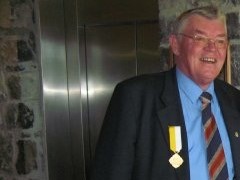Archive
Archive
John Aldridge was appointed in March 1992 as Resident Organist and Director of Sacred Music at Knock, and became well-known and liked by the many pilgrims and parishioners at Knock. To mark his recent passing, the staff at Knock Museum have delved into the archives to bring us this lovely piece that was written shortly after John beginning his role at the Shrine.
Our thoughts and prayers are with his family and friends, may he rest in peace.


John was born in England, and while still a child, he emigrated with his parents to Central Africa. Ir was there that he developed a love of music and learned to play the organ. He played in an Anglican Church, since he belonged to that faith, but in due course he converted to Catholicism. He pursued a career in financial services and broadcasting but music, particularly sacred music was his first love.
In due course he came to Ireland, and carried on his business living in Greystones, but after a time, having arrived at a cross-roads in his life, he went on a pilgrimage to Medjugorje. While there, he has what he calls “an extraordinary spiritual experience”, which led him to give up his business and “follow more closely the Way of Christ”. Meantime, with his wife Marianne and his family, he came to Knock, to consider carefully where that way might take him, or as he himself unaffectedly admits “to await further instructions”. During those months of waiting he taught music in the village, and on the actual anniversary of his visit to Medjugorje, he was appointed as Director of Music at Knock.
Already after those few short months, there is a new awareness of music at the Shrine, particularly during the pilgrimage season, when the organ becomes such an integral part of every service. At all times it adds that extra dimension to the liturgy, and with quiet unobtrusive dignity raises it to the highest devotional level. The choice of repertoire is wide, as is acceptable to the most discriminating ear, since it includes so much that is the ‘lingua franca’ of music, from the classical set pieces of Bach, Mozart, Handel, to the sweeping strains of Verdi, Franck or Elgar. At the same time, its Irish roots are never forgotten and it is normal to find a folk tune like ‘The Cuilfionn’ or some similar air, mingling with familiar old hymns. All of these, including the varying seasonal responses are thoughtfully chosen and brilliantly executed to enhance and enrich every moment of the ceremonies. In short, it lifts the music at the Shrine onto a universally acceptable professional sphere, appropriate to an international Shrine.
At parish level too, John Aldridge makes a very worthwhile contribution. It is his responsibility to train and rehearse the choir, and he has made a significant difference to them, making their work more interesting by his fresh approach. When he is not play in the organ for numerous services, John can be found in his office at the top of the sacristy, quietly at work thinking out new works for inclusion as the season progresses. Surrounded by hymn books and hymn sheets, he sits at his desk and works through the specific requirements of the liturgy. Then as the manuscript pages become dotted by his pen, the thoughts take on reality, and the material is worked on with the choir. Bearing in mind that Knock is now a focal point for so much devotion, and others who need to communicate and consult on musical matters. It is a huge task which demands not just technical expertise, but also that ‘sixth sense’ which responds at once to the demands of the moment, and is the mark of the true musician. Few outside those trained in the discipline will understand the complexity, and the scale of commitment which is required to achieve and maintain results on that high level of excellence.